Throughout his career, Larry Holmes had been underestimated. When he started fighting his way up the heavyweight ranks while working as a sparring partner for Joe Frazier and Muhammad Ali, no one thought he was championship caliber. Even after he defeated Ken Norton in a thrilling fifteen round war to win the WBC version of the title, he couldn’t get his just due. In 1980 many actually believed a decrepit Ali had enough left to beat him, and after that the pundits gave challengers Leon Spinks and Gerry Cooney solid odds to take his crown. Instead, Holmes went on to rack up twenty successful title defenses and he’s now generally regarded as one of the best heavyweights to ever step through the ropes. But in 1988 he was still being underestimated, specifically in regard to mass appeal.
Holmes’ career had supposedly come to an inglorious end with two close decision losses to Michael Spinks in 1985 and ’86. After the first defeat, an angry Holmes, who had been one win away from tying Rocky Marciano‘s record of 49 straight victories, told the press that the great Marciano “couldn’t carry my jockstrap.” After losing another close decision to Spinks, which most observers felt should have gone to Larry, the former champion spiced up his post-fight interview by declaring that “the judges, the referees and promoters can kiss me where the sun don’t shine.”
So perhaps those staging Holmes’ showdown with Mike Tyson could be forgiven for thinking it wasn’t a match-up worthy of exposure on closed-circuit or pay-per-view, opting instead to air it on HBO. After all, Holmes was old, unpopular and had been out of action for almost two years. And surely it was a foregone conclusion that Tyson, easily the most impressive heavyweight anyone had seen in years, would dispose of Larry with little difficulty. Tyson vs Holmes was an intriguing match-up, but it lacked mass appeal. Right?
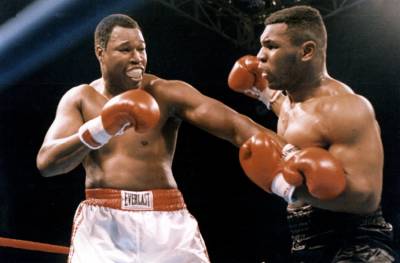
And yet, come fight time, as the two gladiators strode through a sold-out Atlantic City Convention Hall surrounded by their respective entourages, the electricity in the old arena was palpable. Afterwards, more than one observer marveled at the tension in the air, jitters and goosebumps afflicting even the more grizzled occupants in the press section. The degree of anticipation and excitement surprised even the organizers of the show, including one Donald Trump.
What all had misjudged was the power and appeal of a classic story-line, and what had been overlooked was that Larry Holmes, despite his graceless comments, represented greatness. No one could deny that. And since most agreed Holmes had been robbed in the second Spinks bout, a Tyson vs Holmes match offered another rendition of that stirring and timeless old tale: the clash between the wise, old king and the bold, young usurper.

Tyson vs Holmes was a battle for heavyweight history, as well as a bellwether bout for the phenomenon they called “Kid Dynamite.” People wanted to know: was Mike Tyson really as awesome as he appeared? This force of destruction who had bested virtually every serious contender in the division, was he a candidate for the pantheon? Or could the canny old veteran expose him, find the chink in the armour, the unseen weakness, and rob him of his power?
Others would eventually take advantage of Tyson’s shortcomings, but in fact this was Iron Mike’s peak. His unique blend of power, quickness and ferocity would never be more potent. At the opening bell, Holmes appeared startled by Tyson’s speed as the young champion bore in and unleashed wicked shots to the body. Forcing the former champion to continually backpedal and clinch, Tyson gave Larry no time to set himself, no chance to find his rhythm. The veteran tried in vain to land a big uppercut or right hand to get Mike’s respect, but his timing was woefully off.
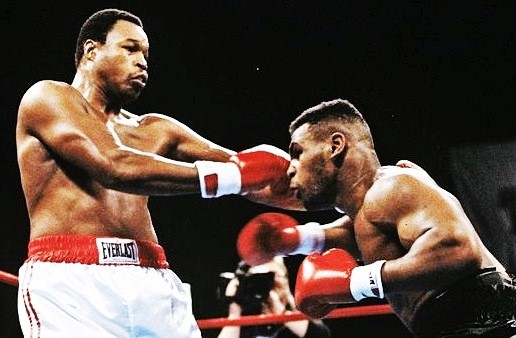
The pattern continued in the second: Tyson pressing, landing to the body, Holmes retreating and clinching, even scurrying out of harm’s way to avoid being cornered. In the third, Holmes started timing the young upstart a bit better and landed a sharp right hand and a few uppercuts on the inside, but Tyson remained the more effective fighter, his two-fisted assault forcing Larry to clinch again and again. But while Tyson had won the opening three rounds, he appeared frustrated with the constant holding and wrestling as he got in a blatant low blow near the end of the third and a left hook after the bell.
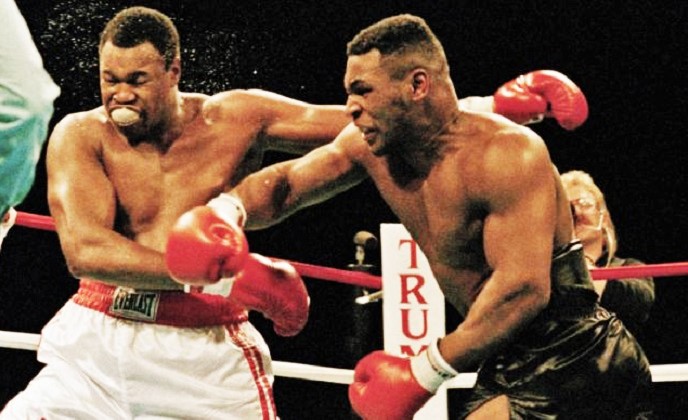
In the fourth Holmes gave the nostalgic in the crowd a bit of what they had hoped to see. Up on his toes for the first time, he circled the ring with seeming authority, snapping home several quick jabs, for a moment looking something like “The Easton Assassin” of old. But the vision was fleeting. His 38-year-old legs soon failed him and then it was back to grappling and clinching and trying to slow down the younger, faster man. But Tyson never stopped throwing big punches with bad intentions and finally one got through and did major damage.
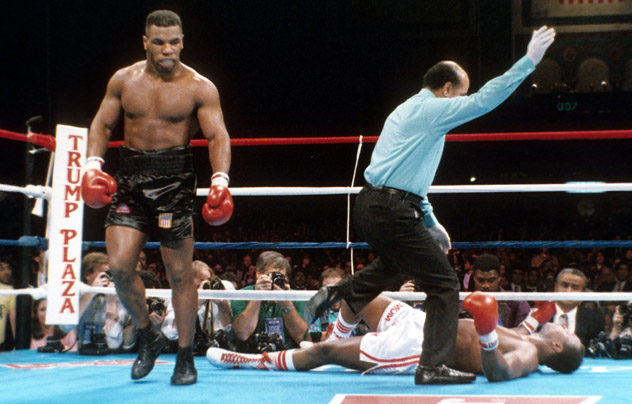
Midway through the round Tyson found the opening he was looking for and nailed Holmes with a perfectly timed overhand right, the shot putting Larry down hard. Shocked as much as hurt, the old champion made the novice mistake of getting up too quickly from the knockdown, his head still ringing as Tyson tore back in and sent him down a second time. And again the proud Holmes was upright in seconds.
Tyson pursued as his dazed quarry frantically reeled about the ring on unsteady legs, Holmes resembling a sailor on the deck of a storm-ravaged ship as he tried in vain to regain his equilibrium, in the process taking punch after punch. A series of right hand clouts drove Larry to the ropes where “The Easton Assassin” planted himself, timed Tyson as he came in, and then let go with a huge uppercut. But the punch never happened; instead Holmes’ fist got snagged in the ropes. A second later Tyson landed the coup de grâce, a final right flush on the jaw that put the former champ flat on his back. The referee waved his arms over the fallen old warrior as officials and cornermen flooded the ring.
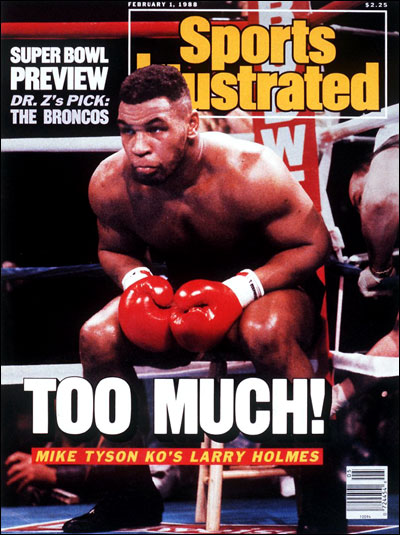
The torch had been passed. History had been made. Tyson vs Holmes had proven who was the rightful heir to the old king’s crown, the only disputant remaining being Michael Spinks, whom “Iron Mike” would demolish in 91 seconds later that same year. And did Holmes have any sharp comments to make, any protest, anymore angry words to offer? “Tyson is a lot better than I thought,” said the humbled ex-champ. “A lot better. People can talk about Spinks all they want. Tyson is the true champion.” – Michael Carbert











